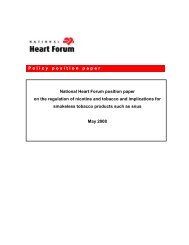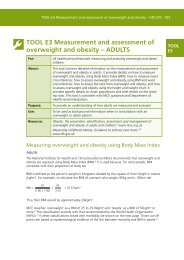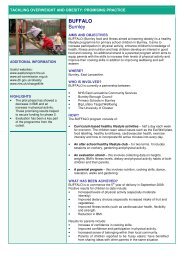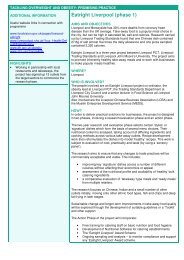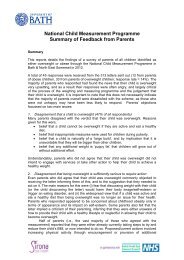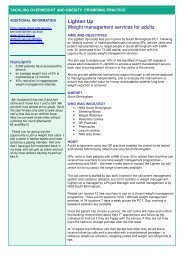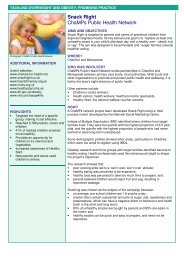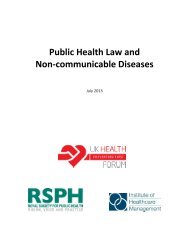The Challenge of Non-Communicable Diseases and Road Traffic ...
The Challenge of Non-Communicable Diseases and Road Traffic ...
The Challenge of Non-Communicable Diseases and Road Traffic ...
Create successful ePaper yourself
Turn your PDF publications into a flip-book with our unique Google optimized e-Paper software.
72 <strong>The</strong> <strong>Challenge</strong> <strong>of</strong> <strong>Non</strong>-communicable <strong>Diseases</strong> <strong>and</strong> <strong>Road</strong> <strong>Traffic</strong> Injuries in Sub-Saharan Africa<br />
conditions, <strong>and</strong> NCDs; for example, evidence for<br />
common causes; shared underlying social conditions;<br />
interacting co-morbidities; as well as common<br />
solutions such as vaccination, st<strong>and</strong>ardized<br />
syndromic protocols, <strong>and</strong> care models. Many <strong>of</strong><br />
the measures needed for strengthening health systems<br />
cut across disease categories, <strong>and</strong> there are<br />
opportunities for NCDs <strong>and</strong> RTIs to benefit from<br />
the lessons <strong>and</strong> initiatives <strong>of</strong> interventions for HIV/<br />
AIDS, TB, <strong>and</strong> maternal health, for example, <strong>and</strong><br />
vice versa. Thus, the report concludes that there<br />
is likely to be added value in capitalizing on the<br />
shared challenges, drivers, <strong>and</strong> potential solutions<br />
across the different disease categories, with broader<br />
health-systems strengthening measures, <strong>and</strong> that<br />
there is already evidence <strong>of</strong> this taking place <strong>and</strong><br />
being effective.<br />
Globalization, rapid urbanization, population<br />
growth, <strong>and</strong> ageing are contributing to the burden<br />
<strong>of</strong> disease in SSA, as NCDs <strong>and</strong> RTIs emerge from<br />
the shadows. <strong>The</strong> response to NCDs <strong>and</strong> RTIs in SSA<br />
needs to avoid establishing yet another set <strong>of</strong> vertical<br />
programs in competition for scarce resources.<br />
As the evidence shows, divisions between disease<br />
categories, or between so-called vertical <strong>and</strong> horizontal<br />
programs, are to some extent artificial, <strong>and</strong><br />
may not be optimal for Africa at this stage <strong>of</strong> its<br />
health development. Opportunities for integration<br />
can arise out <strong>of</strong> synergies between targeted interventions,<br />
necessity, or desirability [493]. Consideration<br />
<strong>of</strong> NCDs <strong>and</strong>/or RTIs within broader development<br />
initiatives could, for example, mean mitigating the<br />
impact <strong>of</strong> road infrastructure, buildings, <strong>and</strong> urban<br />
design on safe <strong>and</strong> active travel, by building in from<br />
the start ways <strong>of</strong> keeping pedestrians <strong>and</strong> cyclists<br />
safe <strong>and</strong> for managing speed. Or it could mean designing<br />
programs to maximize benefit <strong>and</strong> minimize<br />
harm in terms <strong>of</strong> NCD <strong>and</strong> RTI outcomes, such as<br />
ensuring that infant feeding programs <strong>and</strong> conditional<br />
cash transfer programs are not designed in<br />
such a way that they worsen NCD outcomes.<br />
It should also be possible to continue ongoing efforts<br />
to strengthen health systems in ways that enable<br />
the benefits to be shared – this report has included<br />
examples <strong>of</strong> how improvements for NCD care can<br />
‘piggy-back’ onto other existing efforts at little additional<br />
cost, such as extending chronic care delivery<br />
to span a spectrum <strong>of</strong> diseases with similar care<br />
needs, or for palliative care to reach beyond AIDS,<br />
or for demographic <strong>and</strong> other health surveys to be<br />
exp<strong>and</strong>ed to incorporate measurement <strong>of</strong> NCDs <strong>and</strong><br />
their risk factors. Finally, there are a number <strong>of</strong> NCD<br />
interventions that are not only cost-effective but also<br />
potentially resource-generating <strong>and</strong> beneficial for<br />
dealing with other diseases, such as putting in place<br />
<strong>and</strong> enforcing a strong regulatory <strong>and</strong> fiscal framework<br />
for tobacco <strong>and</strong> alcohol including the raising<br />
<strong>of</strong> prices. In making this happen, <strong>and</strong> facilitating it,<br />
there are roles not just for politicians <strong>and</strong> policymakers<br />
within countries but also at the regional <strong>and</strong><br />
international level. <strong>The</strong>re is also work for researchers<br />
in furthering the evidence base on the integration <strong>of</strong><br />
health programs, the integration <strong>of</strong> health concerns<br />
into other development interventions, <strong>and</strong> in different<br />
country contexts.<br />
In conclusion, it should be clear that controlling<br />
NCDs <strong>and</strong> RTIs are key public health issues in Africa.<br />
Ensuring an effective response, however, is a particularly<br />
difficult challenge in countries facing a double<br />
or triple burden <strong>of</strong> disease with a low national income<br />
level <strong>and</strong> weak health care systems. As argued<br />
here, <strong>and</strong> fully consistent with the health improvement<br />
<strong>and</strong> poverty alleviation objectives <strong>of</strong> World<br />
Bank work in the health sector [494-495], efforts to<br />
address this challenge effectively in Africa should be<br />
part <strong>of</strong> broader multisectoral effort, including health<br />
system strengthening programs <strong>and</strong> activities, that<br />
need to be supported by national governments, public<br />
<strong>and</strong> private employers <strong>and</strong> businesses, civil society,<br />
<strong>and</strong> the international community over the short<br />
<strong>and</strong> medium terms. It is expected therefore that this<br />
report will contribute to advance the discussion on<br />
this topic in Africa <strong>and</strong> beyond in the years to come.



